
Sustainable cannabis brands to support in 2022
A growing number of Canadian cannabis users are looking for more than just high THC levels when purchasing their cannabis products.
In times of raging wildfires, devastating floods and rising sea levels, climate anxiety is taking its toll and consumers are looking to reduce their own environmental impact.
Consumers are getting savvier when it comes to researching different cannabis companies. They want to know how cannabis is grown, processed and packaged.
And frankly, not all cannabis products have the same impact on the environment.
These brands offer terpene- and cannabinoid-rich weed and actively work towards environmental, social, and/or economic sustainability.
Sustainable cannabis brands across Canada
Simply Naked by Rubicon Organics
British Columbia has a reputation for having many environmentally conscious citizens, so it’s no surprise that many organic and sustainable cannabis companies have taken root in the province.
Rubicon Organics’ Simply Bare cannabis product line in Delta, BC employs multiple sustainability practices to produce high quality cannabis available throughout Canada.
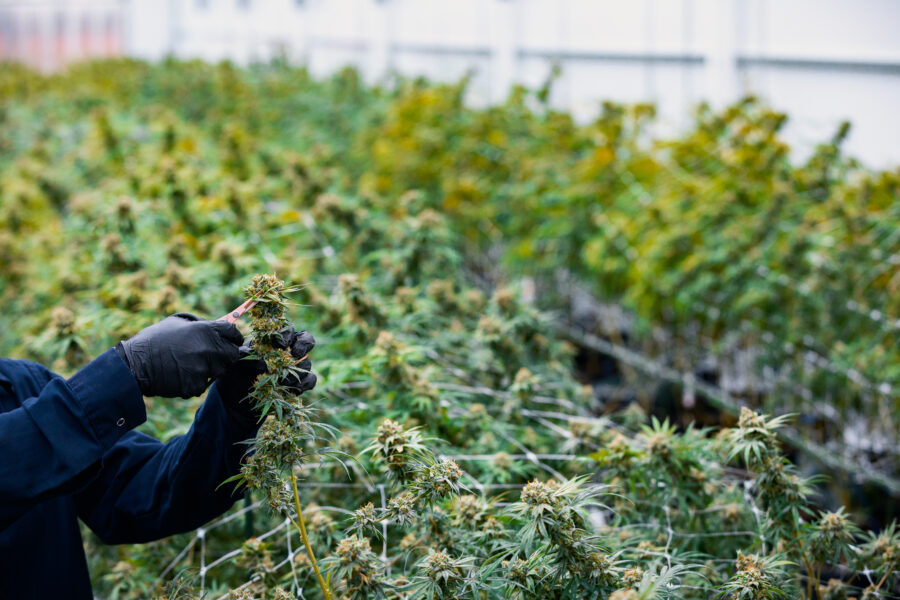
Sustainability characteristics:
- Cannabis grown in the sun in hybrid greenhouses complemented with highly efficient LED lights.
- Uses living soil growing medium (active ecosystem of beneficial soil biological organisms to make nutrients naturally available to the plants).
- Locally sourced ingredients from the BC coast, including Douglas fir bark, worm droppings, seaweed and fishmeal.
- Organic certification by the Fraser Valley Organic Producers Association (FVOPA).
- Working toward meeting the standards of an environmental farm plan that includes a carbon capture/reuse system, 100% stormwater recycling, and net-zero energy and waste.
Products:
- Dried Flowers (Blossoms and Pre-Rolls)
- hashish
- living rosin
- PAX Distillate Capsules
Good buds from Good Buds Company
Good Buds, based out of Salt Spring Island, BC, is a family-run business established in the back of a pickup truck, producing “craft cannabis on organic soils adjacent to the Salish Sea.”
Good Buds is an example of how sustainably grown cannabis can be of exceptionally high quality, having won Kind Magazine’s 2020 Concentrate of the Year award.
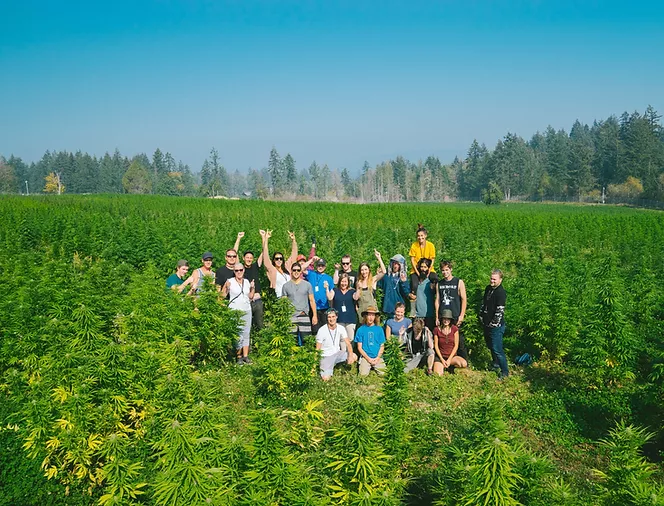
Sustainability characteristics:
- Grown in recycled shipping containers
- All products, including extracts, are certified organic – no chemicals are used for extraction (use of ice water and heated pressing methods)
- Uses collected rainwater
- Organic certification by the Fraser Valley Organic Producers Association (FVOPA)
- Uses living soil growing medium
- BC’s First Certified Living Wage Employer in Cannabis
Products:
- Dried Flowers (Blossoms and Pre-Rolls)
- bubble hash
- Solvent-free rosin
The Green Organic Dutchman (TGOD)
The Green Organic Dutchman (TGOD) has a philosophy that they must do more than grow certified organic cannabis, they are about cultivating a way of life. They take a broad approach to sustainability in decisions made by their facility, packaging, products, employee apparel and more.
Based in Ancaster, ON, their sustainability practices go beyond the environment to encompass environmental, social and governance (ESG) issues, including participating in a Good Neighbor program and growing organic fruits and vegetables to support it to donate to local food banks.
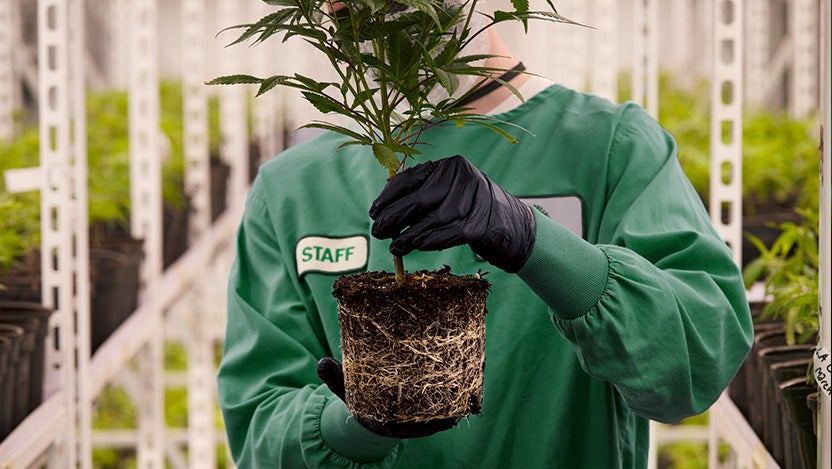
Sustainability characteristics:
- Hybrid greenhouses with sunlight/LED lighting system
- Rainwater recovery system to reduce water and electricity consumption
- Living Soil growing medium reduces their landfill waste by avoiding 200,000 rockwool units of landfill waste/year (roughly the size of 3 NHL hockey rinks).
- Facilities built to LEED (Leadership in Energy and Environmental Design) standards
- Blackout blinds to avoid light pollution
- First certified organic producer in Canada to receive EU Good Manufacturing Practices (EU-GMP) certification in preparation for commercialization later this year
- First cannabis company in Canada to create an Environmental Farm Plan
- Participates in Operation Pollinator, an international biodiversity program, and Ontario’s Barn Swallow Project
Products:
- dried flower
- THC and CBD oils
- Edibles: soluble powder, teas, gummy bears
- Vape Extract Cartridges
Stewart Farms
Stewart Farms is an organic grower raising “fish, weed and microbes” in Saint Stephen, NB. With aquaponics and living soil, they can produce organic cannabis sustainably and with as little plastic as possible. Stewart Farms started out with bath bombs and has recently added craft cannabis and pre-rolls to their product portfolio.
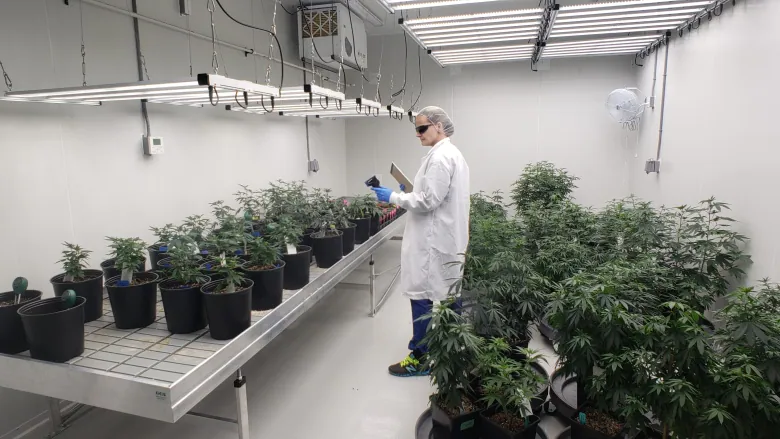
Sustainability characteristics:
- The closed water recycling system uses 90% less water than conventional farming
- Fish by-products are converted into natural nutrients for plants in a self-sustaining ecosystem
- The vertical farming system uses less square meters for more efficient use of resources and reduced carbon footprint
- No pesticides or artificial fertilizers
- 100% biodegradable packaging, including the foil on the bath bombs
Products:
- Infused (and non-infused) bath bombs
- make flower
- roll forward
Reef Organic by Aqualitas
Reef Organic Products by Aqualitas is an outstanding company for sustainable practices. Based in Brooklyn, NS, Aqualitas combines aquaculture and organic living soil to create consistent quality cannabis products.
CEO Myrna Gillis says that sustainability is encouraged and supported at all levels of leadership and her sustainability philosophy is “do no harm and do better”.
She notes that growing indoors with an ecological design (aquaculture combines fish and plants for less waste and better nutrients) is part of a sustainable future in an uncertain climate and increasing soil erosion.
Their goal is to offer “the healthiest products, grown as closely as possible to nature’s conditions”, which has paid off as they have been recognized twice by High North Labs for having the highest cannabinoid profiles, including a cannabinoid content of 34% train for their ghost haze.
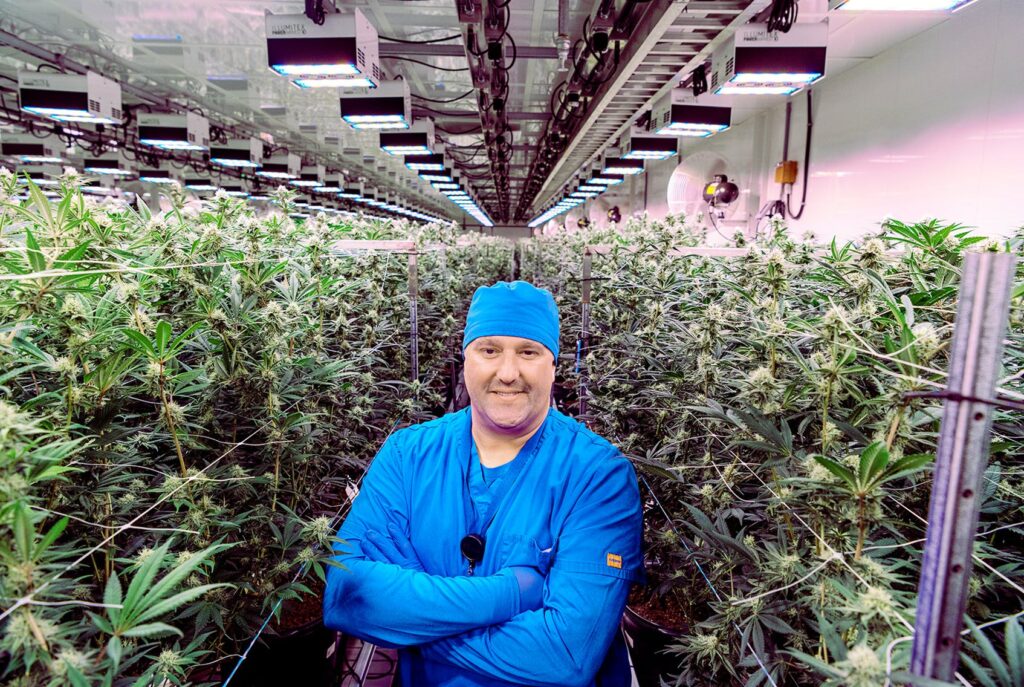
Sustainability characteristics:
- Sustainability commitment from cultivation to packaging
- In a small square footage aquaponic facility, they make their own balanced fish food for their long-lived koi fish
- Committed to fair trade and a 5% reduction in carbon footprint each year
- Use of gray water systems to reduce water consumption
- Ocean Sourced Packaging – Plastic pollution from the ocean that is collected, reclaimed and reused for packaging
- All Reef Organics products are Clean Green Certified (CGC)
- Winner of Spark Innovation Award and Clean Tech Energy Award
Products:
- Dried Flowers (Blossoms and Pre-Rolls)
- THC and CBD oils
- Vape Extract Cartridges
- rosin
- Edibles (gummy candy)
Consumers – watch out for greenwashing
What does sustainable cannabis even mean? The word sustainability has evolved and adapted to mean not only environmental sustainability but also social and economic sustainability.
Some cannabis companies are guilty of “greenwashing” – appearing to be more environmentally friendly than they actually are. In our quest for truly eco-friendly cannabis, we’ve looked beyond superficial claims to find the companies that actually live up to their sustainability credentials.
Buying sustainable products doesn’t have to require an overwhelming amount of research or an in-depth understanding of sustainability principles and farming practices.
Salina Perry
Salina May Perry lives in Lethbridge, Alberta and is a passionate cannabis enthusiast. She holds a BSc degree in Environmental Sciences from Royal Roads University in Victoria, BC, as well as an Environmental Professional (EP) distinction.
Check out Salina Perry’s articles
By submitting this form, you are subscribing to Leafly news and promotional emails and agreeing to Leafly’s Terms of Service and Privacy Policy. You can unsubscribe from Leafly email communications at any time.

Post a comment: